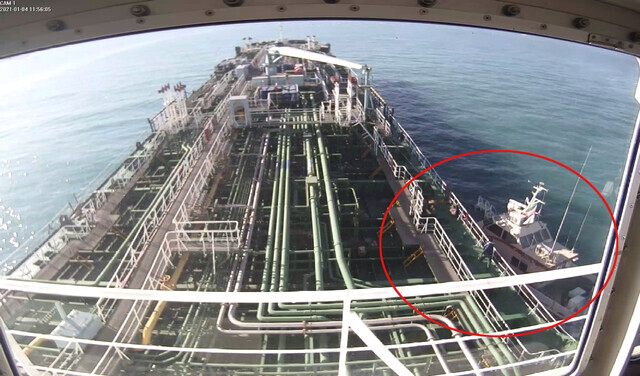hankyoreh
Links to other country sites 다른 나라 사이트 링크
[Editorial] S. Korea needs to skillfully navigate US-Iran tensions for release of detained vessel

At a delicate time when tensions have risen between the US and Iran, the MT Hankuk Chemi, a South Korean chemical and oil tanker, was seized on Jan. 4 by Iran’s Islamic Revolutionary Guard Corps in the Strait of Hormuz. The official statement from Iran was that the ship had “violated regulations concerning the marine environment,” but the real reason appears linked to the complicated international political situation ahead of Joe Biden’s inauguration in the US. Whatever the factors, we urge the Iranian government to quickly release the vessel and its 20 crew members.
South Korea and Iran have been clashing over payments for Iranian crude oil amounting to around US$7 billion that have been frozen in two South Korean banks. Deposited in an account under the name of the Central Bank of Iran, the money was supposed to be paid by South Korea for its importation of the crude oil, but has remained tied up since the Donald Trump administration backed out of the US’ nuclear deal with Iran and reimposed sanctions. Analysts say Iran seized the vessel to pressure South Korea into paying.
There are also elements of this being a blinking contest ahead of Biden’s inauguration. Tensions between Tehran and Washington have been rising sharply, and Jan. 3 marked the one-year anniversary of a US air raid that killed Qasem Soleimani, an Iranian major general. The US has ratcheted up military pressure by dispatching B-52 strategic bombers and the Nimitz aircraft carrier to the Persian Gulf. In response, Iran resumed enriching uranium up to 20% purity; shortly after that, the Hankuk Chemi was seized. In effect, South Korea has found itself tangled in the US-Iran chess match to gain the upper hand in the nuclear negotiations that are likely to restart when Biden takes office.
With the international political situation changing rapidly as the Biden era approaches, South Korea’s diplomacy is being put to the test. Iran has only given a vague statement that the situation will be “handled in accordance with the law,” raising fears that things could drag out into the long term. Seoul plans to dispatch a delegation headed by the director of the Ministry of Foreign Affairs (MOFA) African and Middle Eastern Affairs Bureau, while Vice Minister of Foreign Affairs Choi Jong-kun is set to arrive in Tehran on Jan. 10.
Quite a few critics have suggested that the reason for South Korea and Iran’s relationship souring has to do with MOFA focusing too much on the Trump administration’s wishes and responding too halfheartedly to Iran’s demands. Seoul needs to marshal all of its diplomatic resources, discussing things closely with Biden’s transitional committee — which places high priority on Iran issues — and sending Minister of Foreign Affairs Kang Kyung-wha to Tehran if necessary. Hopefully, this crisis can be converted into an opportunity by ensuring the swift return of the vessel and its crew, improving South Korea-Iran relations, and boosting our diplomatic cooperation with the US.
Please direct comments or questions to [english@hani.co.kr]

Editorial・opinion
![[Editorial] Yoon must halt procurement of SM-3 interceptor missiles [Editorial] Yoon must halt procurement of SM-3 interceptor missiles](https://flexible.img.hani.co.kr/flexible/normal/500/300/imgdb/child/2024/0501/17145495551605_1717145495195344.jpg) [Editorial] Yoon must halt procurement of SM-3 interceptor missiles
[Editorial] Yoon must halt procurement of SM-3 interceptor missiles![[Guest essay] Maybe Korea’s rapid population decline is an opportunity, not a crisis [Guest essay] Maybe Korea’s rapid population decline is an opportunity, not a crisis](https://flexible.img.hani.co.kr/flexible/normal/500/300/imgdb/original/2024/0430/9417144634983596.jpg) [Guest essay] Maybe Korea’s rapid population decline is an opportunity, not a crisis
[Guest essay] Maybe Korea’s rapid population decline is an opportunity, not a crisis- [Column] Can Yoon steer diplomacy with Russia, China back on track?
- [Column] Season 2 of special prosecutor probe may be coming to Korea soon
- [Column] Park Geun-hye déjà vu in Yoon Suk-yeol
- [Editorial] New weight of N. Korea’s nuclear threats makes dialogue all the more urgent
- [Guest essay] The real reason Korea’s new right wants to dub Rhee a founding father
- [Column] ‘Choson’: Is it time we start referring to N. Korea in its own terms?
- [Editorial] Japan’s rewriting of history with Korea has gone too far
- [Column] The president’s questionable capacity for dialogue
Most viewed articles
- 1Months and months of overdue wages are pushing migrant workers in Korea into debt
- 2Trump asks why US would defend Korea, hints at hiking Seoul’s defense cost burden
- 3[Editorial] Yoon must halt procurement of SM-3 interceptor missiles
- 4At heart of West’s handwringing over Chinese ‘overcapacity,’ a battle to lead key future industries
- 5[Guest essay] Maybe Korea’s rapid population decline is an opportunity, not a crisis
- 6Fruitless Yoon-Lee summit inflames partisan tensions in Korea
- 7First meeting between Yoon, Lee in 2 years ends without compromise or agreement
- 8Dermatology, plastic surgery drove record medical tourism to Korea in 2023
- 9Under conservative chief, Korea’s TRC brands teenage wartime massacre victims as traitors
- 10Anti-immigration candidate marauds across Korea with squad detaining foreigners